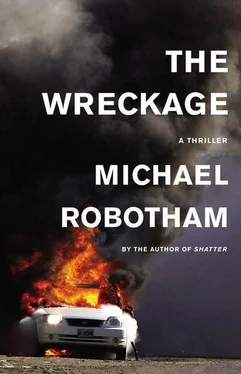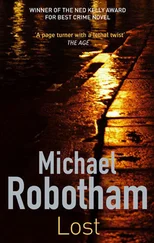Michael Robotham - The Wreckage
Здесь есть возможность читать онлайн «Michael Robotham - The Wreckage» весь текст электронной книги совершенно бесплатно (целиком полную версию без сокращений). В некоторых случаях можно слушать аудио, скачать через торрент в формате fb2 и присутствует краткое содержание. Жанр: Триллер, на английском языке. Описание произведения, (предисловие) а так же отзывы посетителей доступны на портале библиотеки ЛибКат.
- Название:The Wreckage
- Автор:
- Жанр:
- Год:неизвестен
- ISBN:нет данных
- Рейтинг книги:3 / 5. Голосов: 1
-
Избранное:Добавить в избранное
- Отзывы:
-
Ваша оценка:
- 60
- 1
- 2
- 3
- 4
- 5
The Wreckage: краткое содержание, описание и аннотация
Предлагаем к чтению аннотацию, описание, краткое содержание или предисловие (зависит от того, что написал сам автор книги «The Wreckage»). Если вы не нашли необходимую информацию о книге — напишите в комментариях, мы постараемся отыскать её.
The Wreckage — читать онлайн бесплатно полную книгу (весь текст) целиком
Ниже представлен текст книги, разбитый по страницам. Система сохранения места последней прочитанной страницы, позволяет с удобством читать онлайн бесплатно книгу «The Wreckage», без необходимости каждый раз заново искать на чём Вы остановились. Поставьте закладку, и сможете в любой момент перейти на страницу, на которой закончили чтение.
Интервал:
Закладка:
“Saddam knew the attack was coming, so three days before the air assault he sent his son Qusay to the al-Rafidain Bank in central Baghdad. He had a handwritten note from the President, written in Arabic, authorizing the withdrawal of nine hundred and twenty million US dollars.
“It took them two hours to load the cash on to three tractor-trailers. The bills were sealed in aluminum boxes, each containing four million dollars.”
“Whose money was it?”
“Semantics,” says Gooding. “What belonged to Iraq belonged to Saddam.”
“Four weeks later, twentieth April, US ground forces had captured Baghdad and Saddam was in hiding. The second brigade of the Third Infantry Division had taken up residence in Saddam’s new presidential palace on the west side of the Tigris. Two US Army sergeants went searching for a chainsaw to clear branches. Staff Sergeant Kenneth Buff and Sergeant First Class Daniel Van Ess noticed a windowless cottage. They broke it open and discovered forty galvanized aluminum boxes, riveted shut, with lead seals and plastic strapping. Another forty cases were found next door. Six of them were selected at random and opened. Each contained four million US dollars in neatly stacked hundred-dollar bills. Third Infantry organized a wider search. By nightfall they’d found one hundred and sixty-four boxes. That’s a haul of six hundred and fifty-six million dollars.”
“What’s this got to do with Mohammed Ibrahim?”
“I’m getting to that. Like I said-the cases were sealed, signed and dated. The signature was that of Mohammed Ibrahim, Saddam’s paternal cousin and a lieutenant colonel in the Republican Guard.
“Two days later, reservists from the 354th Civil Affairs Brigade found another stash in a wooded neighborhood where top Baath Party officials lived. Twenty-eight cases were hidden in dog kennels that had been bricked up with cinder blocks and cement. The seals bore the same signature.”
“And this came from the original bank robbery?”
“They recovered all but one hundred and fifty million US.”
Luca glances at Daniela, who is sitting near the window. With the light behind her, he can’t see the look on her face.
“What about Ibrahim?” he asks.
Gooding answers. “After the invasion, most of the leading Baathists scattered, mainly to Syria and Jordan. Mohammed Ibrahim stayed under the radar because nobody considered him to be very important. He was a junior public servant. It was only later they discovered he was Saddam’s bagman.”
“Where is he now?”
“The US military stumbled upon him almost by accident. They were searching for Saddam and rounded up dozens of his former drivers and bodyguards in December 2003. Ibrahim was among them, but he wouldn’t talk. Over the next thirteen days they arrested forty of his relatives and closest friends. They had the names of another twenty. Ibrahim did a deal. He gave up Saddam and his family were released.
“The task force flew to a farmhouse near Tikrit. It still took them three hours to find Saddam. Ibrahim had to show them the entrance to the rat hole. You know the rest. Saddam was put on trial. Executed. Ibrahim was sent to Camp Bucca and later transferred to Abu Ghraib. Classified as high security.”
“So he should be in prison, awaiting trial?”
“I assume so. Why?”
“No reason.”
“Tell me.”
“I met someone who claimed to have seen him on the border between Iraq and Syria seven months ago.”
“A credible witness?”
“A paid informant.”
Luca needs another favor-the name of a stringer working out of Damascus; someone who can ask questions and check out an address. Gooding gives him the number of Tony Castro.
“What’s he like?”
“Can’t write, can’t spell, but he has the instincts of a ferret.”
“Ferrets are much-maligned creatures.”
“You’d know more about that than me.”
Gooding wants first refusal on the story and they negotiate expenses, but the price will have to wait. Luca has spent most of his cash reserves buying a new engine for the Skoda. Hanging up, he calls the stringer in Damascus.
Tony Castro has a booming voice and an Italian accent that makes him sound as though he’s yelling out orders for takeaway pizzas. The introductions are brief. He’s heard of Luca, remembers the Pulitzer Prize, but doesn’t seem impressed.
Luca tells him about the warehouse near the airport in Damascus. The sign: Alain al Jaria-Ever-Flowing Spring.
“I need to know who owns it and what it’s used for.”
“Anything else?”
“Look out for the name Ibrahim.”
“No shortage of Ibrahims here.”
“This one is an Iraqi. His full name is Mohammed Ibrahim Omar al-Muslit, also known as the Fat Man.”
“I’ll get back to you.”
Luca hangs up and continues making calls. For the next two hours he runs an obstacle course of transfers, denials or being put on hold. He is passed between four different sections at the Interior Ministry before getting a “no comment” regarding Mohammed Ibrahim. Jenkins at the US Embassy is “in a meeting” and then “gone for the day.” The US military command wants the request in writing and approved by the Iraqis.
Out of ideas, he calls Jamal. “I know I said I wouldn’t ask you for any more favors…”
“What do you need?”
“Information. The prisoner’s name is Mohammed Ibrahim Omar al-Muslit. Arrested December 2003. Interned at Abu Ghraib awaiting trial.” Luca doesn’t mention the link to Saddam or the smuggled cash. “Don’t push it too hard,” he says. “Make a call and then leave it alone.”
At two p.m. the phone rings in Daniela’s room. Edge is twenty minutes away. He’s ready for the run to the airport.
Daniela leans forward and takes Luca’s hands in hers, pressing down hard with her thumbs. Her eyes fasten on his. “Give this up. You’re fixated on something that can only bring trouble.”
“Don’t you want answers?”
“I can live without them.”
The last woman Luca cared about had accused him of sitting on the sidelines, unwilling to get involved, a spectator not a player. This one wants him benched and out of the game.
Opening the flap of his shirt pocket, Luca touches the folded photograph of Nicola. He opens it on his lap, smoothing the crease with his fingers.
“I owe you a story.”
“You don’t have to,” says Daniela.
“I want to.”
He begins at the beginning. Nicola had worked for the National Library of Iraq, tracing and restoring the priceless manuscripts and books that had been looted or damaged during the invasion. It shouldn’t have been a dangerous job, but the library had been bombed twice and attacked by snipers who had shot out several windows.
Luca had gone to do a story on the restoration and Nicola took him on a guided tour of the library, explaining the importance of the collection and how much was still missing. Passionate and beautiful, she’d been educated in Geneva where her father had worked as a diplomat before falling out with Saddam. Later she studied bookbinding and restoration in Venice.
It took Luca six weeks to convince her to have a coffee with him. Her sister acted as chaperone. “I’m not going to fall in love with you,” Nicola told him, “because you will leave me one day.”
They were together for nearly two years, “not in love” she insisted, but that was just playing with words. One Friday afternoon the wages didn’t arrive at the library. Nicola offered to collect them from the bank because it was a long weekend and people needed money for food and fuel. She took a taxi as far as al-Mutanabi Street, which was only five hundred yards from the library. The street is named after one of the greatest Arab poets, who lived in Iraq in the Middle Ages. Famous for its bookstores, it is a favorite place for writers and impoverished intellectuals.
Читать дальшеИнтервал:
Закладка:
Похожие книги на «The Wreckage»
Представляем Вашему вниманию похожие книги на «The Wreckage» списком для выбора. Мы отобрали схожую по названию и смыслу литературу в надежде предоставить читателям больше вариантов отыскать новые, интересные, ещё непрочитанные произведения.
Обсуждение, отзывы о книге «The Wreckage» и просто собственные мнения читателей. Оставьте ваши комментарии, напишите, что Вы думаете о произведении, его смысле или главных героях. Укажите что конкретно понравилось, а что нет, и почему Вы так считаете.












